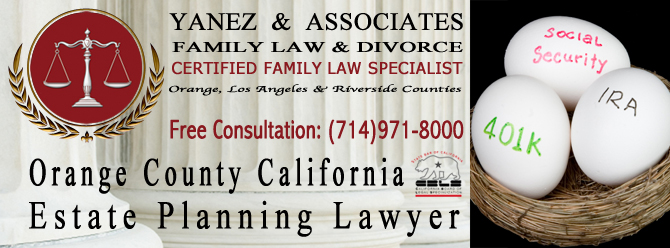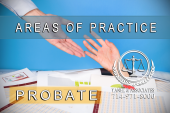FAQ: How Can a Top Estate Planning Attorney Help Me in Orange County?
Estate planning is a big part of elder law that encompasses much more than simply writing a will. It deals with all aspects of creating and executing a plan for a person’s care, property, assets and debts if that person dies or becomes incapacitated.
The estate planning process can begin before a person becomes a senior citizen, and it is often a good idea to start early. However, plans will usually need to be updated as lives go on, and changes happen.
An estate planning attorney can help you through the entire process, or through any portion of it. Because of the complex nature of estate plans, especially when it comes to planning for a successful execution of the plan during a stressful time, it is always a good idea to have an attorney help you throughout the planning process. A simple mistake could lead to disagreements and other issues in the execution of any part of an estate plan.
What Does Estate Planning Entail?
Estate planning is a legal process that creates a legally binding plan for a person’s life if he or she is unable to make decisions. A great estate plan includes terms for a person’s end of life health and care, including finances, so that if something happens, either a decision has been made, or a decision maker has been appointed. In addition, a great estate plan includes terms for distributing a person’s property, including assets and debts, upon that person’s death.
Because these topics are so broad, estate planning offers a lot of legal options for creating and executing plans.
Wills, Trusts, and Passing on Your Property
During a person’s lifetime, he or she works hard building a life and accumulating property, debts, and assets. This includes anything that a person owns, from a business to a home to money in a bank account.
Even young adults can benefit from an estate plan - in the case of an unexpected death, estate plans can help your loved ones by laying out a plan for them.
A great estate planning lawyer can help you determine the best way to distribute your property. Some options that are available in California are better than others for certain situations. For example, it may be beneficial to give gifts to loved ones during your lifetime, or, it may be more beneficial to create a trust. Certain options may offer you more tax advantages while others may allow you more or less control over your finances while you are alive.
The first step of estate planning is to figure out what you own and what you owe. You may need to work with a finance professional in addition to your attorney. Once you know what you have, your lawyer can help you consider your options for distribution.
• Trust - A trust is a situation where property is temporarily owned and managed by a trustee. The property in the trust belongs to a beneficiary, who will have access to the property at a designated time.
• Living Trust - A living trust is a trust that is created while a person is still alive, and can usually be revoked, or taken back, at any point. Some trusts are irrevocable, which means that they cannot be taken back once created.
• Will - A will is a document that names specific beneficiaries that will inherit property and assets from the owner of the will. It also names an executor of the will, who will ensure that the terms of the will are followed. A will might also include names of people to take guardianship of any minor children. Property that is passed on through a will may be subject to a probate tax.
• Special Needs Trust - When an individual needs special care, the person providing that care can create a special needs trust for the disabled person’s benefit. The funds in the trust are only to be used for basic care, and will usually allow the beneficiary to remain eligible for government benefits.
Remember that there are many other options in addition to these, and your lawyer can help you determine which is best for you. Things like taxes, your family relationships, your health, the health of your family and loved ones, and what you want can all play a role in making decisions for you.
End of Life Care and Financial Planning
Estate planning also allows you to create a plan for your own health and care for the end of your life. This might include time in a nursing home, or, it might only come into play in the case that you are incapacitated and unable to make decisions for yourself. It also allows you to decide how you want your body to be taken care of following your death.
You will need to plan for your finances at the end of your life as well. You may be eligible for government benefits, like social security, you may need to plan for your insurance, and you might need to plan how to invest or save your finances. Every estate plan is different, and yours should be based on your individual needs.
Sometimes, especially early in life, it can be difficult to plan for the future when it is so uncertain. However, your lawyer can help you consider your options depending on the situations you face, and he or she can let you know what kinds of assistance or planning are available to you right now.
The following are some things that you can plan now just in case, and that you may change later if necessary.
• Health Care Power of Attorney - This document names a person called a health care proxy, and grants that person the right to make decisions regarding the health care of the grantor in the case that the grantor becomes incapacitated. For example, naming your son as your health care proxy in a health care power of attorney allows your son to make health care related decisions for you if you can no longer do so yourself.
• Power of Attorney - This document names a person, called an attorney-in-fact, who can take the place of the grantor when it comes to making certain decisions in specified situations. These decisions should be specified ahead of time, and usually involve the person’s finances and legal matters. Usually, power of attorney ends when the grantor dies.
Why Do I Need an Estate Plan Right Now?
A young adult might think that not having many assets, or not having children, means that a will is unnecessary. A healthy person might assume that they don’t need to have a medical power of attorney because incapacitation only happens to the elderly. The point of an estate plan is to have a plan for the future no matter what happens so that decisions can be made quickly and in accordance with your wishes. Whether you have children, parents, siblings, friends, or you want to donate your property to a charity, and whether you are healthy or not, it is always a good idea to have a plan - just in case.
Unfortunately, having an ineffective plan, or one with errors might lead to a lot of issues down the road. Unclear plans or those that cannot be executed because they are not done correctly lead to unanswered questions, long legal processes, arguments within families in a stressful time, and decisions made according to the law that ultimately may not be what you wanted or what was best.
It is just as important to update an estate plan as it is to create a great one in the first place. Things like marriage, death, birth, and adoption all affect your family life, and they can all change how a plan will work.
• Probate - Probate is the process by which a will is legally validated, and it’s terms followed unless there is no will in place. In the case that there is no will, property will be distributed during probate, but according to California’s intestacy laws.
• Intestate - This situation occurs when a person dies without having a valid will in place. This means that the person’s property is distributed according to California’s intestacy laws.
• Executor - An executor is a person, named in a will, who is responsible for ensuring that the terms of the will are followed and that the deceased person’s estate is handled properly.
Orange County Estate Planning Lawyer
Estate planning is only one part of elder law, and its legal issues span over years of your life and into your family, friends, and other loved ones. Having an effective and valid estate plan not only affects you and your own life and property, but also the lives of your loved ones.
For help creating a great estate plan, you’ll need the assistance of a great estate planning lawyer. Contact the lawyers at Yanez & Associates today to schedule your free initial consultation.
















